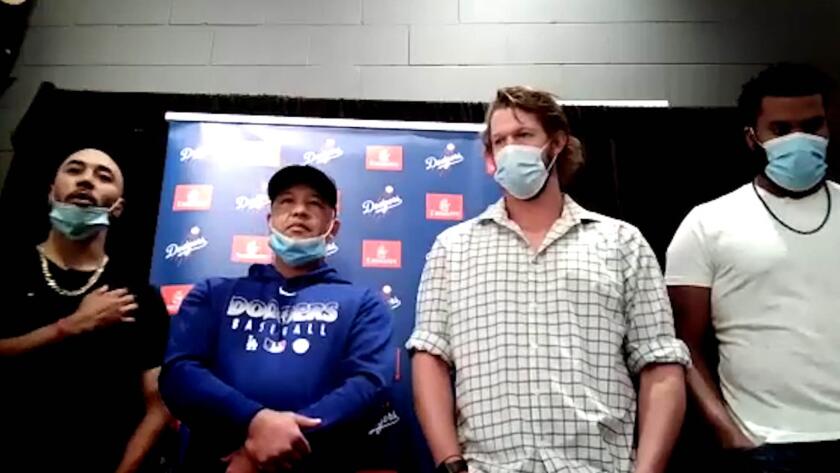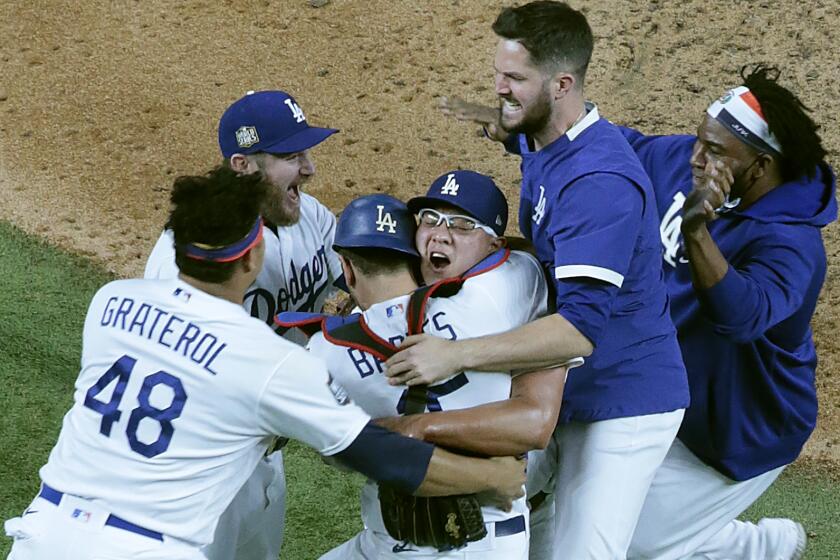Column: The most important game of the Dodgers’ World Series title season was one they didn’t play
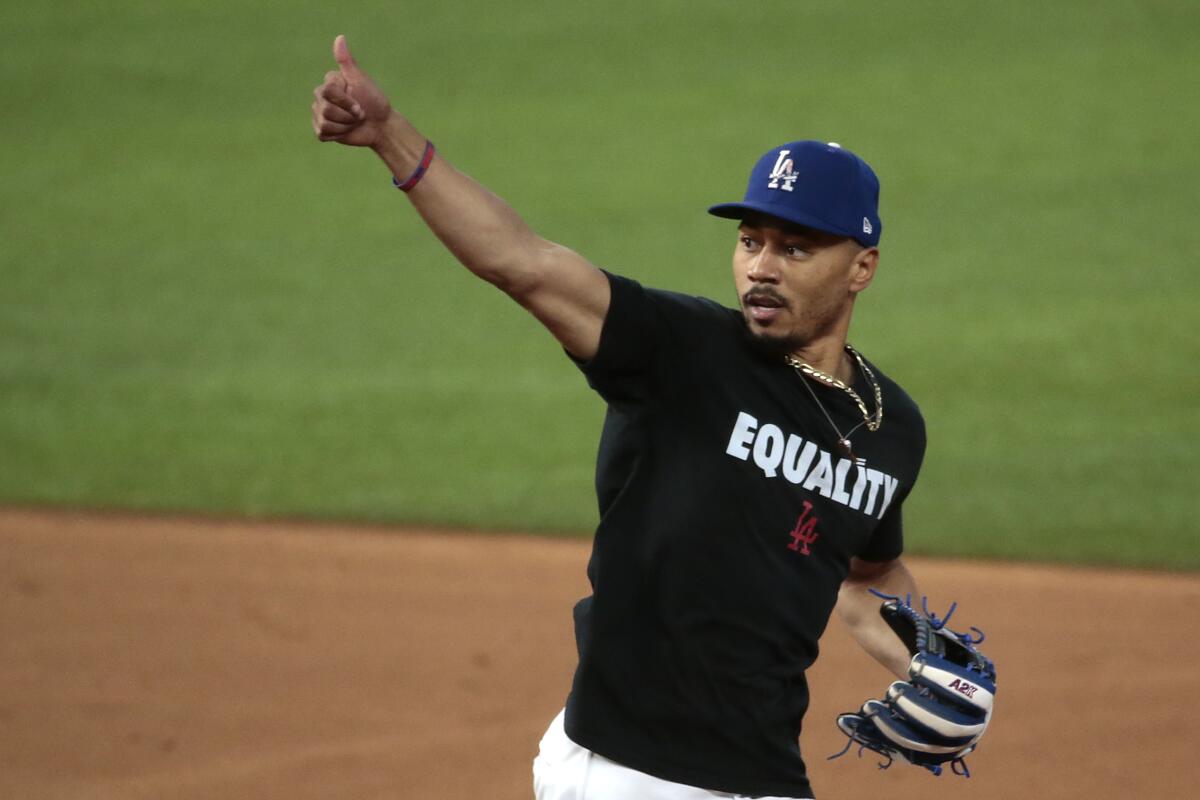
- Share via
The Dodgers’ most important game this season was one they didn’t play.
Their greatest team moment occurred when the dugout was empty.
Their biggest victory was never recorded.
The Dodgers’ first World Series championship in 32 years was capped Tuesday night against the Tampa Bay Rays with many symbolic milestones, the stuff of memories, historical sound bites.
“Three to one score” . . . ”Four games to two” . . . ”First title since 1988” . . . ”Corey Seager MVP”
But if you’re looking for a tagline to describe the 2020 season, you’re looking in the wrong place. The single word that epitomized the Dodgers’ inspiringly united journey can be unearthed in a description of the outcome of the Aug. 26 game against the San Francisco Giants.
“Postponed.”
Mookie Betts, the Dodgers’ only African American player, wasn’t going to play that night as a message of social protest, so his teammates didn’t play either.
- Share via
Mookie Betts, from left, with Dodgers manager Dave Roberts and pitchers Clayton Kershaw and Kenley Jansen, discuss the team’s decision to postpone a game in protest of the police shooting of Jacob Blake.
The unification of a diverse and once-divided clubhouse behind the wishes of a relatively new player spoke volumes about this club’s cohesiveness, a trait which later translated into a resiliency that resulted in a ring.
Long before Betts’ stole a city’s heart with his leaps and sprints, he touched the Dodgers’ soul by sitting. When everyone else in uniform joined him, that’s when this team became special. That’s when they became champions.
“What the Dodgers did with Mookie Betts carried great meaning for that team and who they are,” said former Dodgers general manager Fred Claire at the time. “What I saw was unity.”
This story has previously been told on these pages by the Times’ Jorge Castillo, as well as in this space, but it is worth retelling, once more, in the hindsight of a championship journey that was clearly fueled by its impact.
Before 43-17, there was the postponement. Before the NLCS comeback against the Atlanta Braves, there was the postponement. Before the resiliency to overcome the ninth-inning Game 4 debacle against the Rays, there was the postponement.
‘I talked to my teammates, told them how I felt, they were all by my side. I couldn’t ask for better teammates than what I have here.’
— Mookie Betts on the Dodgers supporting him when he chose to sit out a game after the shooting of Jacob Blake
“For me, I wasn’t going to play tonight, I have to stand by my guns here,” said Betts at the time.
When his teammates chose to stand by their right fielder, much like Brooklyn’s Pee Wee Reese once stood by Jackie Robinson, a new legacy was formed, a new culture was created, and the new and glorious ending was being shaped.
“I talked to my teammates, told them how I felt, they were all by my side,” Betts said. “I couldn’t ask for better teammates than what I have here. ”
For the next two months, the sports world saw that again and again, Betts playing with unbridled joy, the Dodgers following his lead with uncommon passion, everyone sharing the successes and the stumbles and eventually the glory.
The postponement had its roots on the other side of the country, where earlier that August day, in the Orlando-area NBA bubble, the Milwaukee Bucks refused to take the floor for their playoff game in protest of the police shooting of Jacob Blake in Kenosha, Wis. The NBA postponed all three of its playoff games that day, and later postponed two more days of games.
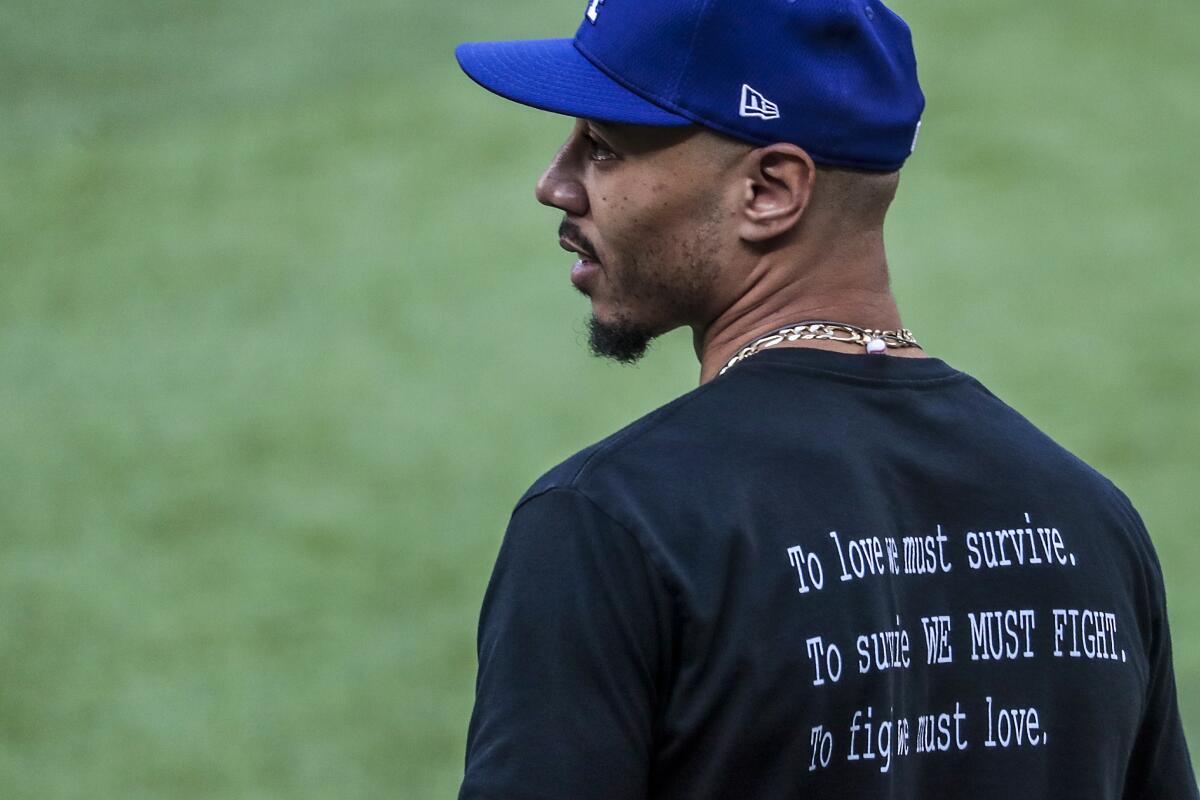
Meanwhile, in San Francisco, Betts was pondering. He was communicating with friends and relatives. He felt an obligation to participate in the social justice movement, but how?
After arriving at San Francisco’s Oracle Park prepared to suit up, he decided he would play his part by not playing.
“Changes need to be made, I have to use my platform to at least get the ball rolling,” Betts said, later adding, “In my shoes, I couldn’t play.”
He told his teammates. They listened. They took the field in the midafternoon for pregame warmups. Then, shortly before 4 p.m., they walked off.
“Mookie was great about saying, ‘If you guys want to play, I support that,’” said Clayton Kershaw at the time. “But we made a collective group decision not to play tonight, to let our voices be heard for standing up for what we believe is right.”
Four Dodgers explained their position that night in a Zoom webinar — Betts, Kershaw, manager Dave Roberts and Kenley Jansen. Together they formed a diverse and powerful coalition with an equally powerful message.
Complete coverage of the Dodgers winning their first World Series championship since 1988 after defeating the Tampa Bay Rays in the 2020 World Series.
“As a white player on this team . . . how can we show support?” said Kershaw. “What is something we can do to help our Black brothers on this team?”
Kershaw added, “What some of our Black teammates, what some of the Black players around the league, some of the things they’ve been through, I’ll never understand, and it’s trying to figure out how to support them in the best way possible.”
It was a stark contrast to the lack of support offered to Black players from other teams. On the same night all the Dodgers sat out for Betts, Matt Kemp sat alone in Colorado, Jason Heyward sat alone in Chicago, and only Jack Flaherty sat with Dexter Fowler in St. Louis.
That Dodgers’ decision to postpone together visibly affected the usually understated Betts.
“I was already tight with everybody in the clubhouse, but now that I know everybody has my back even more than I already thought, [it] means a lot,” he said at the time. “I’ll always remember this day. I’ll always remember this team just having my back.”
Dodgers fans will surely remember what happened next.
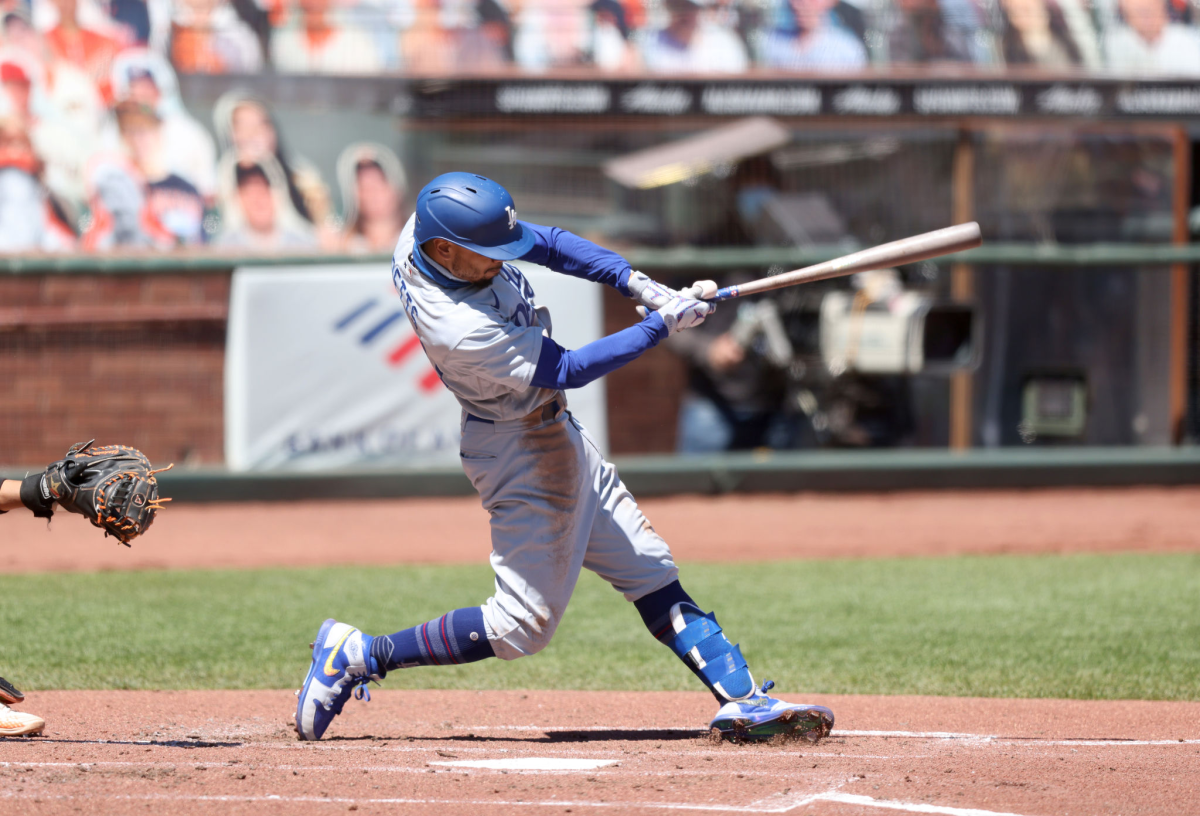
The postponement forced a doubleheader of seven innings each the following day, and it was then that the Dodgers began their dominant run to the title. They not only swept, they didn’t allow the Giants to score in either game, winning by a combined 9-0.
Kershaw, whose scheduled start was bumped by the postponement, threw six shutout innings in the opener. In the two games combined, nine total Dodgers pitchers gave up six total hits.
The Dodgers streaked out to eight wins in the next nine games and the rest became Los Angeles history. Although the postponement may have long since been forgotten, its impact will be felt forever, and it could be heard late Tuesday night in the celebratory words of its two main organizers.
“Everything is special about this group of guys,” Betts said. “We love each other, we played for each other and not just the Dodgers, and that’s how great teams are made.”
Kershaw concurred.
“I’ve been on some great teams, but this team was really, really special, all the way through . . . guys that play their roles so well.”
None played better than on the night they didn’t play at all.
More to Read
Are you a true-blue fan?
Get our Dodgers Dugout newsletter for insights, news and much more.
You may occasionally receive promotional content from the Los Angeles Times.

